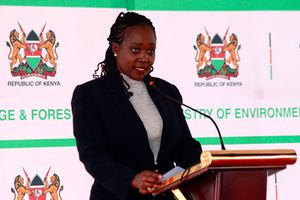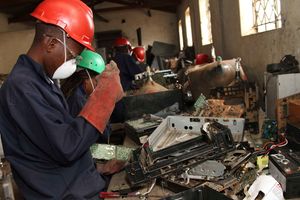Africa Climate Summit: Non-state actors table demands

Pan African Climate Justice Alliance Executive Director Mithika Mwenda at a past event. The organisation has highlighted that climate change impacts are infringing on the betterment of livelihoods of Africans.
What you need to know:
- Last week while meeting Kenyan editors in Nairobi, Environment CS Soipan Tuya explained that the government is focused on addressing climate issues and not ‘blame games’ that involve blaming the global north for the climate crisis.
A group of 11 non-state actors drawn from religious organisations, civil society organisations and trade unions across the continent have tabled six demands to African presidents ahead of the upcoming Africa Climate Summit.
The group also says it rejects anti-African proposals that increase climate risks for the continent and transfer undue burdens of addressing the climate crisis to African countries, yet these countries are already suffering the adverse impacts of the crisis.
“We remind African leaders that some proposals or actions claim to address the climate crisis yet in reality, they either have no significant impact on reducing greenhouse gas emissions or, worse, have negative social and environmental consequences. These proposals are promoted by powerful interests that benefit from maintaining the status quo of fossil fuel dependence and they divert attention and resources from the real solutions that are urgently needed.”
Last week while meeting Kenyan editors in Nairobi, Environment CS Soipan Tuya explained that the government is focused on addressing climate issues and not ‘blame games’ that involve blaming the global north for the climate crisis.
“This is not about who is polluting the least or who is polluting the most, we want to work together with everyone to avert this crisis,” she said.
This is why according to the non-state actors, as the continent gears for the inaugural Africa Climate Week, which will be held in Nairobi from September 4-8, African leaders are under pressure to listen to the voices of their people who are bearing the brunt of the climate impacts.
The group led by Dr Mithika Mwenda, the executive director of the Pan African Climate Justice Alliance (PACJA), a network of more than 1,000 organisations from 48 countries in Africa, highlighted that climate change impacts are infringing on the betterment of livelihoods of Africans.
“While the continent is witnessing the devastating effects of floods, droughts, cyclones food insecurity and others, there is a noticed gap and failure in the accountability of developed countries in supporting the global south to adapt to the adverse impacts of climate crisis caused by the global north,” he said.
“Though there are minimal efforts to address these impacts, the upcoming Africa Climate Summit is a unique opportunity for the continent to raise the red flag and ensure that Africa’s voice, through its leaders, raises the urgency of addressing the climate emergency and protecting the rights and livelihoods of its citizens,” the non-state actors said.
“It is also an opportunity to build momentum and solidarity for the African agenda at COP28 and beyond by highlighting African countries' common interests and aspirations in achieving a low-carbon, climate-resilient, and inclusive development,” their joint demand letter highlights.
They further point out that they have been steadfast in advocating for a just and equitable transition to a low-carbon, climate-resilient future that respects the rights and dignity of all people.
“In the past several weeks, we held direct and indirect engagements with the Kenyan Government, the African Union Commission and the larger ClimDev-Africa Initiative under the aegis of an independent Non-State Actors' Committee, which was established to ensure that the summit reflects the voices and aspirations of African people. Despite these engagements and the evidence provided by the latest science, we are worried that the summit may fall short of these aspirations.”
The joint demand letter, which was read by Dr Mithika, notes that this is why the group has formulated a set of demands.
“Stand by the principles of climate justice, human rights, gender equality, and intergenerational equity in all climate policies and actions, reject false solutions and narratives that undermine African communities' rights, interests and sovereignty such as carbon markets, geoengineering, nuclear energy and the principle of share responsibilities. Commit to a just and equitable transition to renewable energy, ensuring that energy access is prioritised for the poor and marginalised and that community ownership and participation are guaranteed, demand that developed countries fulfil their historical responsibility and provide adequate and predictable finance, technology transfer, and capacity building to support adaptation, mitigation, and loss and damage in Africa, continue to advance for shared and collective accountability in country’s leadership in the implementation of AU mandate and put the African people above all personal and collective political and economic interests,” the six demands by the group state.
The letter further calls out what it describes as Kenya’s latest obsession with carbon markets, which the group sees as greenwashing.
“The carbon market initiatives our leaders are excited about are useless and will disappoint as they do not serve a purpose,” Mr Mithika cautioned.
“We demand that the principle of common but differentiated responsibilities must continue to guide global climate action and underpin the common African position. Therefore, we call on the summit to uphold the following priorities for Africa in its decisions and engagement with global and regional stakeholders,” the non-state actors explained.
They further said that the goal should now be working to complete and adopt the framework for the Global Goal on Adaptation at the world’s biggest climate meet (COP 28) scheduled for November to December this year in Dubai.





